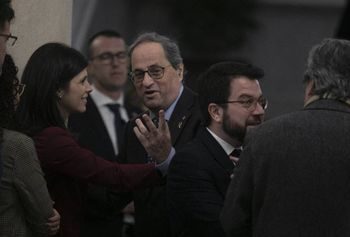
The Spanish government is ready to nominate its economy minister, Nadia Calviño, to head the International Monetary Fund (IMF) as long as she receives enough support from other European countries.
The EU’s proposal to put current IMF chief Christine Lagarde at the helm of the European Central Bank has opened up a race for her succession. EU countries want to put forward a single candidate to increase their chances of having a European in control of the Washington-based organization.
But Madrid will not formally present any candidates until other names are floated and their levels of support gauged. If there is a clear opportunity, Calviño will likely be nominated.
The government has always supported giving the IMF leadership to a European woman of established prestige
Unnamed government source
The protracted economic downturn in Spain made the country lose a lot of weight in the international arena, and the current administration of acting prime minister Pedro Sánchez is trying to make up for lost ground.
The minister herself was non-committal during an interview on SER radio station on Wednesday, when she revealed that she’s discussed the matter with Sánchez, of the Socialist Party (PSOE). On two occasions, Calviño said that the process has just begun and that it is necessary to wait for developments.
On Wednesday evening, the government expressed satisfaction at the fact that Calviño’s name was mentioned as one of the favorites at the G-7 meeting in Chantilly, France.

“The government has always supported giving the IMF leadership to a European woman of established prestige,” said sources at La Moncloa, the seat of central power in Spain.
Government sources said that Calviño has a lot of points in her favor, including ample experience with European institutions, where she held a top post in the EU Commission as director-general of the budget. Besides her technical skills, Calviño’s focus on social issues could benefit the IMF as it seeks to promote a more inclusive recovery from the 2008 economic crisis and keep populism at bay.
Playing against her is the fact that she has not served a full year as minister yet, that she has limited experience at the highest levels of international policymaking, and that she tends to stay away from the media.
Other potential candidates include Olli Rehn, governor of the Central Bank of Finland; Jeroen Dijsselbloem, a former finance minister from the Netherlands who does not have a lot of support in Europe’s peripheral countries, which he made controversial statements about in 2017; and the current head of the Eurogroup, Portuguese finance minister Mário Centeno.
There was an IMF director from Spain between 2004 and 2007: Rodrigo Rato, who is currently serving time for embezzlement in connection with the misuse of corporate credit cards at two banks that required a bailout during the crisis.
English version by Susana Urra.
Get real time update about this post categories directly on your device, subscribe now.





















